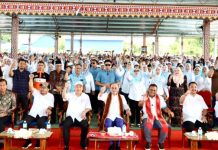KOTA KINABALU: Beginning November 2019 Sabah Chief Minister Datuk Seri Mohd Shafie Apdal has estimated that the state economy may expand with a 5.1% growth in Gross Domestic Product, bolstered by recovery of the global economy that year and next. He said the growth will be supported by positive developments in tourism, agriculture and downstream activities in the state, including the oil and gas industries.
However, the 2019 statistics proved Shafie terribly wrong and way off target with a staggering drop of 4.6% in GDP projection.
In fact, Sabah’s economic growth in 2018 under Shafie’s administration nosedived from a healthy 8.2 percent by the previous government to a mere 1.5 percent, a 6.7 percent YoY GDP drop.
GDP in 2019 (before COVID-19) further deteriorated to almost zero growth (only 0.5 percent).
*Blaming on the pandemic*
Shafie, in his feeble attempt to defend the poor economic performance in 2018 and 2019 has blamed the lockdown due to the pandemic in his speech during the Sipitang District Land Grant Handover Ceremony recently. He said the lockdown attributed to fewer containers brought by tankers. The pandemic only started in 2020 and lockdown only in March this year.
*Looking forward to a new government*
I hope the new Sabah government should capitalize with the strategic location advantage of SABAH in the heart of South East Asia, by transforming our KKIA and Sapangar Bay Container Port to become the Air and Sea Transshipment Hubs in this region which has failed by the previous Warisan led Sabah government. The travelling time from KKIA that within 5 hours radius could reach most of the important cities in Asia.
*Advantage*
Blessings with the strategic location of Sabah in the heart of South East Asia, it will definitely attract more FDI flock into Sabah with a high connectivity to global maritime trade. This connectivity can be leveraged with the setting of logistics zones generating added value and anchoring the port’s cargo base especially in our Sapangar Bay Container Port. It would be the same if it applies to KKIA by generating more revenue for the government.
With the increase of FDI coming into Sabah to setup offices and factories which translated into more job opportunities will be created for the local and also to attract local professional to come back home from other states and oversea to serve in their homeland.
Additionally, it will definitely reduce the air and sea freights transportation cost which translated into cheaper price of goods for the people of Sabah and also benefits our local manufacturers by exporting their goods to overseas with a competitive price in the international market.
By Clement Lee
SAPP CLC Api Api Committee Member






